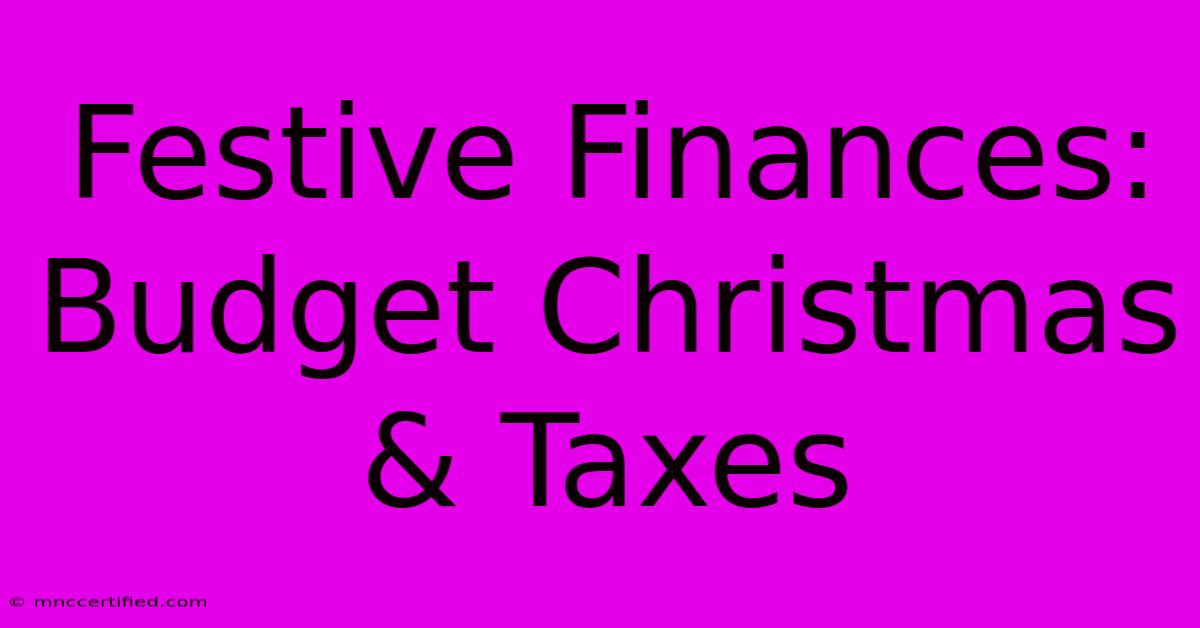Festive Finances: Budget Christmas & Taxes

Table of Contents
Festive Finances: Budget Christmas & Taxes
The holiday season is a time for joy, family, and… a potential financial headache. Between gift-giving, travel, and festive gatherings, Christmas expenses can quickly spiral out of control. But with careful planning and a strategic approach, you can enjoy a joyful Christmas without the post-holiday financial blues. This guide will help you navigate the festive finances, budgeting for Christmas and understanding the tax implications.
Budgeting for a Merry (and Affordable) Christmas
The key to a stress-free holiday season is planning your Christmas budget. Don't wait until December to start thinking about expenses; begin budgeting as early as October or November.
1. Determine Your Spending Limit:
Before you even start browsing for gifts, set a realistic budget. Consider your income, existing debts, and other financial commitments. Be honest about what you can afford without jeopardizing your financial stability. Using budgeting apps or spreadsheets can be invaluable here.
2. Create a Detailed Spending Plan:
Break down your Christmas budget into specific categories:
- Gifts: Allocate a portion for each recipient, considering their age, interests, and your relationship with them.
- Decorations: Avoid impulse buys. Reuse decorations from previous years where possible.
- Food & Drinks: Plan your menus carefully and shop smart, taking advantage of sales and discounts.
- Travel: Factor in travel costs if you're visiting family or friends.
- Entertainment: Budget for festive activities, such as attending Christmas markets or shows.
- Unexpected Expenses: Always include a buffer for unforeseen costs.
3. Smart Shopping Strategies:
- Shop early: Avoid last-minute price hikes and ensure you get the best selection.
- Compare prices: Don't settle for the first price you see. Use price comparison websites and apps.
- Utilize coupons and discounts: Take advantage of sales, promotional codes, and loyalty programs.
- Consider handmade gifts: Personalized gifts are often more meaningful and can be more budget-friendly.
- Shop secondhand: Check out thrift stores or online marketplaces for unique and affordable gifts.
Understanding the Tax Implications of Christmas Spending
While most Christmas expenses aren't directly tax-deductible, there are some exceptions to be aware of:
- Business Expenses: If you're running a business, certain Christmas-related expenses might be deductible. This could include gifts for clients (with limitations) or holiday parties for employees. Consult a tax professional for clarification.
- Charitable Donations: Donations to registered charities are often tax-deductible. Consider donating to your favourite cause instead of buying excessive gifts.
- Travel Expenses: If you're travelling for work during the holiday season, some travel expenses might be deductible. Again, consult a tax advisor for specific guidance.
Important Note: Tax laws vary depending on your location. Always consult with a qualified tax professional or refer to your country's tax authority website for accurate and up-to-date information.
Post-Holiday Financial Recovery
After the festivities, it's crucial to review your spending and start planning for the new year.
- Track your spending: Analyze your Christmas spending to identify areas where you could have saved money next year.
- Pay down debt: Create a repayment plan for any holiday debt incurred.
- Review your budget: Adjust your budget for the new year, factoring in any lessons learned from your Christmas spending.
By following these tips, you can enjoy a financially responsible and joyous Christmas season. Remember, it's about spending quality time with loved ones, not breaking the bank. Happy Holidays!
Keywords:
Christmas budget, holiday budget, festive finances, Christmas spending, budget Christmas, tax implications Christmas, Christmas tax deductions, smart Christmas shopping, affordable Christmas, holiday planning, financial planning, budgeting tips, Christmas gift ideas, saving money Christmas, post-holiday finances, debt management.

Thank you for visiting our website wich cover about Festive Finances: Budget Christmas & Taxes. We hope the information provided has been useful to you. Feel free to contact us if you have any questions or need further assistance. See you next time and dont miss to bookmark.
Featured Posts
-
Major Outage Facebook Instagram Whats App Affect Tens Of Thousands
Dec 12, 2024
-
Kraven The Hunter Review And Analysis
Dec 12, 2024
-
Nancy Maces Capitol Sling Injury
Dec 12, 2024
-
New Jersey Facing Drone Mystery
Dec 12, 2024
-
Nj Drone Sightings Baffle Residents
Dec 12, 2024